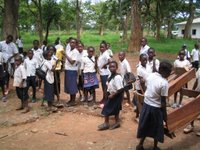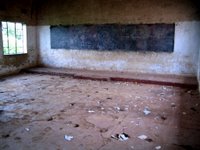Today, I witnessed a woman giving birth. I was visiting the infirmary in a semi-abandoned training facility. Compared with other similar places I have visited in the DRC, it was actually quite functional. For starters, there was a doctor and two nurses. And a few beds, if no sheets. No medicine, but some rusty scales to weigh the baby, and, bizarrely, a mad scientist in the corner clad in a long white lab coat, carefully looking through a microscope. I was only meant to be taking notes, maybe a few pictures. Assessing how long it would take to rehabilitate the place, make the training centre functional once more. I didn’t quite realise what was happening when the doctor ushered me into the last room, ordering my male colleagues to stay behind.
There she was, lying despondently on the bare foam mattress, oblivious to the jovial banter of two chirpy nurses who were vigorously massaging her swollen tummy. I had never witnessed a woman giving birth before, but by contrast to the cries and moans of pain depicted in the movies I’ve seen, this woman was eerily silent and impassive. Not a whimper crossed her clenched teeth, and her eyes as they bore directly into mine reflected a disturbing mix of resignation and sadness.
If deaths are louder than back home, births here are apparently quieter.
At some point it was decided that if the woman had a girl she would be named after me. I’m not sure who ventured the suggestion, but I’m willing to bet that it wasn’t the woman herself; more probably it was the doctor, in a desperate and vain attempt to trigger some reaction from the forlorn mother-to-be. In the end, it was a boy.
Later today, I sat in the back of a classroom filled with some fifty or more children as they learnt about the letter ‘b’. A handful of girls huddled together tightly around the three metallic picnic tables that served as desks, while all the other children sat sprawled on the floor. Needless to say, there were no notebooks or pens in sight. At the end of the class, the girls carried out the tables and the teacher his desk, and took them home with them for safekeeping. I peered mournfully into my handbag at the three sets of miniature crayons I’d brought with me to distribute, a left-over from our Christmas crackers.


So wait a minute. This centre we’re rehabilitating is currently being used as a makeshift school for hundreds of children, a community health clinic, and living quarters for several highly destitute families who are willing to throw a decrepit old mattress in a corner of what used to be the shower rooms and call it their home. So tell me, what happens when we turn it back into a training centre?
And our paths are littered with such contradictions…
1 comment:
Hey sis! Wow all this is pretty impressive!
Hope you're ok, I saw DRC are qualified for the African Nations Cup quarterfinals, which is pretty cool!
Talk to you soon, Marc.
Post a Comment